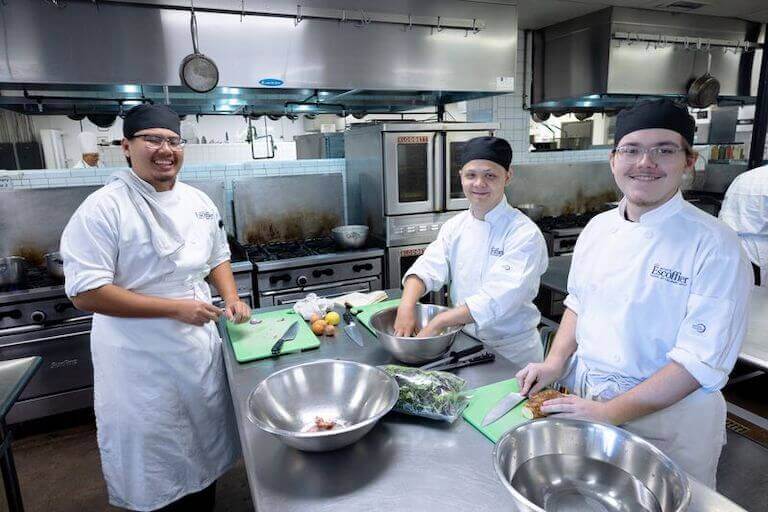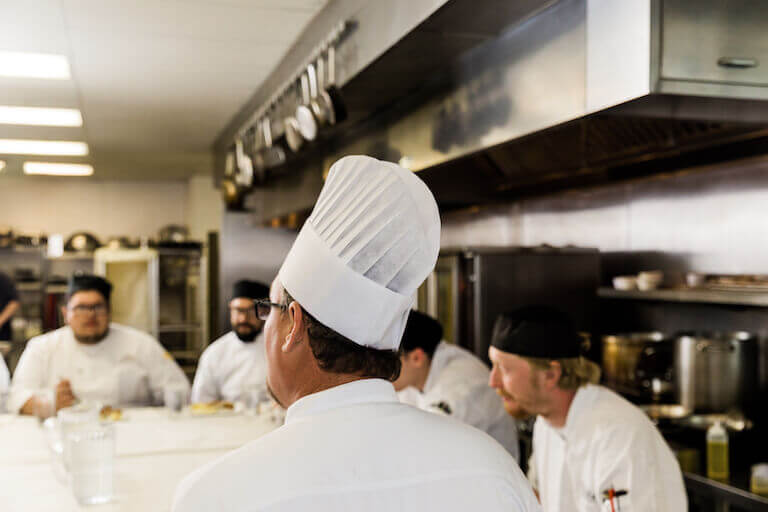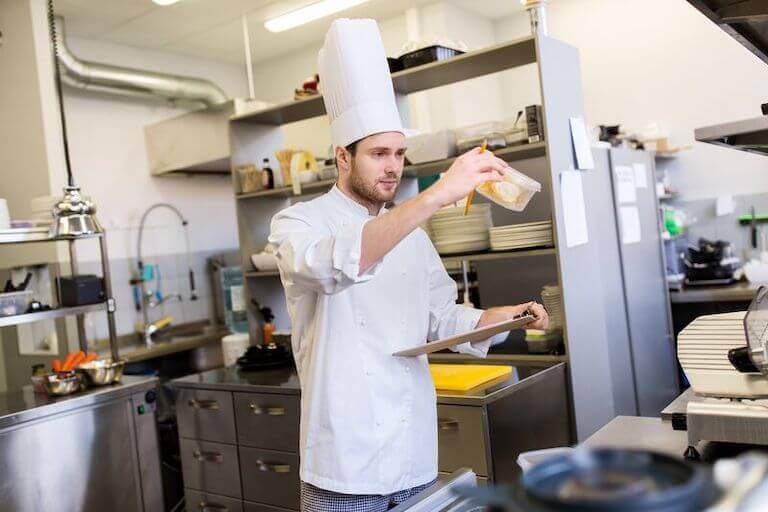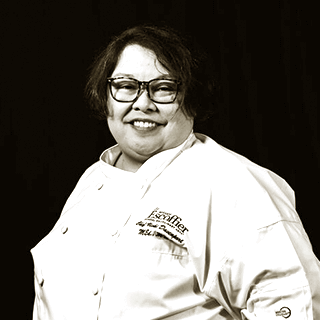Listen to This Article:
Being a chef is not just a good career choice—it’s a great career choice for the right person. The job involves precision and repetition as well as creativity, it can be competitive, and it often includes an element of teamwork. It can also be pressure packed and sometimes challenging, with little room for error.
Does any of that sound intriguing?
In this article, we’ll talk about some of the attributes of this exciting field…so you can decide whether being a chef might be the best career choice for you.
The Job Outlook for Chefs Is Good
Before you explore the details of the position, you might want to know whether you’ve got a good chance of landing a job or making a career out of this field. The good news is, the prospects for chefs are looking bright. The U.S. Bureau of Labor Statistics anticipates faster than average growth for chefs and head cooks from 2023-2033, with a growth rate of 8% compared to 4% for all occupations during that same period.
While everyone’s timeline is different, it is possible to go from beginner to executive chef over the span of several years.* And with the need for chefs growing, it may be easier to move through the ranks of the kitchen than usual.
*Information may not reflect every student’s experience. Results and outcomes may be based on several factors, such as geographical region or previous experience.
For a Chef, the Kitchen Is Your Office
The environment where you work can be a major contributor to your career happiness. Some people want to work outside, so they pursue careers in landscaping, agriculture, and environmental work. Some prefer to work at a desk, so they may pursue work in an office setting or work-from-home jobs.
For others, there’s nothing like the bustle of the commercial kitchen. The kitchen environment keeps you up and moving all day. You’re working with your hands, creating something beautiful and delicious. And unlike the front of house, you’re generally insulated from the view of customers (unless you work in an open kitchen).
How can you be sure that you’ll like the kitchen environment? The best way is to test it. An entry-level kitchen position can help you decide if it’s the right place for you.

At Escoffier’s campuses, students may get a first taste of the kitchen “office.”
Working As a Chef Can Be a Creative Career
Depending on the specific food establishment, being a chef can provide you the opportunity to flex your creative muscles. At a restaurant, hotel, or catering company, executive chefs usually curate the menu and create the recipes. They may decide on the composition of each plate, including entrees and sides.
They may set the final look of each dish, with sauces and garnishes for a pretty presentation. They may determine which substitutions or customizations are available. They get to decide what’s possible—taking into account inventory, workflow, and budget. They often need to get creative with budgets as well as with their plates.
Once a menu is established, chefs may create daily specials and menus for special events, and they may even collaborate with other chefs for one-off dinners. There are endless opportunities to try out new recipes, who to serve them to, and how to serve them.

Chefs are continually trying out ways to be creative with recipes and techniques.
Being a Chef Can Put You at the Lead of a Close-Knit Team
It would be hard to overstate the bonds created in a professional kitchen. Working on the line to complete tickets, communicating with the team, and helping each other to succeed can create close-knit relationships among colleagues. Each shift is like a race to the finish. And as the chef, you’re leading the way.
The camaraderie of the kitchen crew is legendary, with team members often choosing to socialize long after the day’s work is through. The people and relationships that can come with professional kitchen work can be a major draw to the cooking environment.
*Information may not reflect every student’s experience. Results and outcomes may be based on several factors, such as geographical region or previous experience.
A Career as a Chef Can Mean a Lot More Than Working in Restaurants
Chefs usually start out as cooks and work their way through the ranks to the top leadership role. But that’s just one option.
Some chefs choose to work in restaurants throughout their careers. Others build their skills in restaurants but go on to pursue a wide variety of passions. Some may go on to become media personalities, either on popular television networks or as food influencers.
They may write memoirs, like Anthony Bourdain did, or cookbooks like Julia Child. They may become chef consultants or research chefs, helping other food businesses with their products or processes.
They could become personal or private chefs, or start their own restaurants or food trucks. They could even become chef instructors, teaching the next generation of cooks and chefs.
To work in any of these careers, you may have to combine culinary education with a great deal of experience. And that means you have to start out at the beginning: with an entry-level cooking job and/or a culinary school education.

Many Escoffier Chef Instructors were executive chefs during their careers.
*Information may not reflect every student’s experience. Results and outcomes may be based on several factors, such as geographical region or previous experience.
Every Day As a Chef Is Different
Working as a chef does involve hands-on food preparation, but it’s so much more than that. While the kitchen is built on systems and routines, the chef is leading it all. Their responsibilities are constantly shifting and could include personnel management, creating new dishes, troubleshooting equipment, and handling emergencies. In a single week, a chef could:
- Interview candidates for a new position
- Work on recipes for seasonal items
- Onboard a new inventory system
- Update training materials
- Do an interview with local media
- Run a class for front-of-house staff to teach them about new menu items
- And much more!
So if you’re looking for a career that keeps you on your toes, then becoming a chef could be the right career choice for you.

An executive chef or sous chef may have to manage inventory on a regular basis.
How to Get Started as a Chef
Unlike some careers in which you must follow very specific steps to be considered a professional and then to advance, there is no single path to becoming a chef. However, many chefs do follow a similar career trajectory that includes the following steps:
Pursue a Degree or Diploma
A formal education is optional but strongly recommended. Consider pursuing a culinary arts degree or diploma to learn the foundations of sanitation and safety, cooking techniques, seasoning, and much more. In a competitive industry, this can place you ahead of the competition.
*Information may not reflect every student’s experience. Results and outcomes may be based on several factors, such as geographical region or previous experience.
Train and Practice
At Auguste Escoffier School of Culinary Arts, students must complete one or two six-week industry externships to qualify for their degree or diploma program. These brief work experiences can help students practice what they’ve been studying in the classroom and help them identify areas for improvement as well as areas of interest. If you don’t attend a culinary school, you could pursue an apprenticeship for training and experience.
Find a Job and Get Work Experience
Everyone starts somewhere, and for a chef that might mean entry-level positions as a prep cook, line cook, or another skill-building role. If you attended culinary school, you might also take advantage of a professional network to help with your job search.
Get Ongoing Industry Certifications
This step is also optional, but you can become a stronger candidate by boosting your knowledge. Many chefs obtain certification throughout their careers and are lifelong learners. You can take a look at what’s available by checking out The American Culinary Federation, which offers many types of chef certifications.
Climb the Kitchen Hierarchy
If you’re looking to make a career as a chef, you’ll likely keep an eye out for ways to advance through the levels in the kitchen. At this point, you’re familiar with the brigade de cuisine, or the different positions within a kitchen, and you probably have your eye on positions you’re interested in.
To find out more detail about the path to a chef career, check out How to Become a Chef: The Complete Guide.
Like What You See?
Becoming a chef can be a rewarding and exciting career for the right person. Do you think that could be you?
If so, it may be the right time to take the next step. Contact our Admissions Department to get answers to all of your questions about online and on-campus programs in culinary school, what you could learn, and how your education could get you closer to your goal of becoming a chef.
FOR MORE RESOURCES ABOUT BECOMING A CHEF, TRY THESE ARTICLES NEXT:
- Am I Too Old to Become a Chef?
- What Does It Take to Be a Line Cook?
- What It Takes to Be an Executive Chef
This article was originally published March 24, 2023 and has since been updated.




